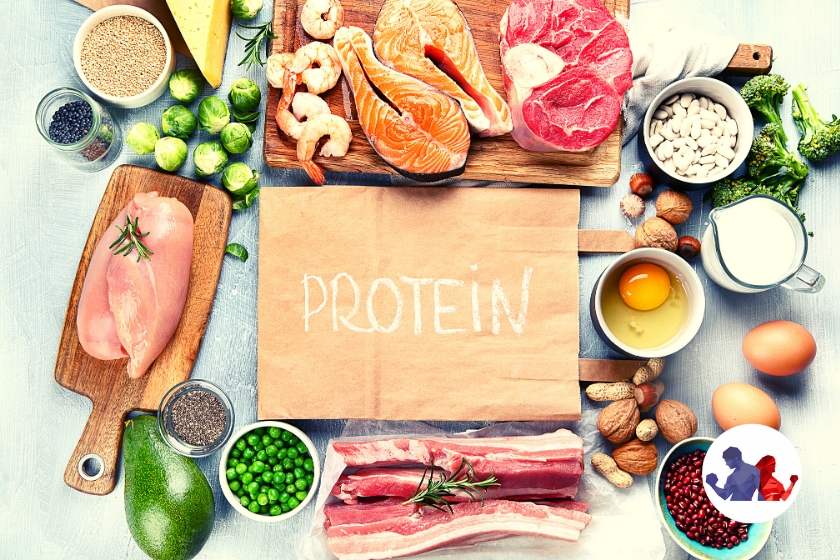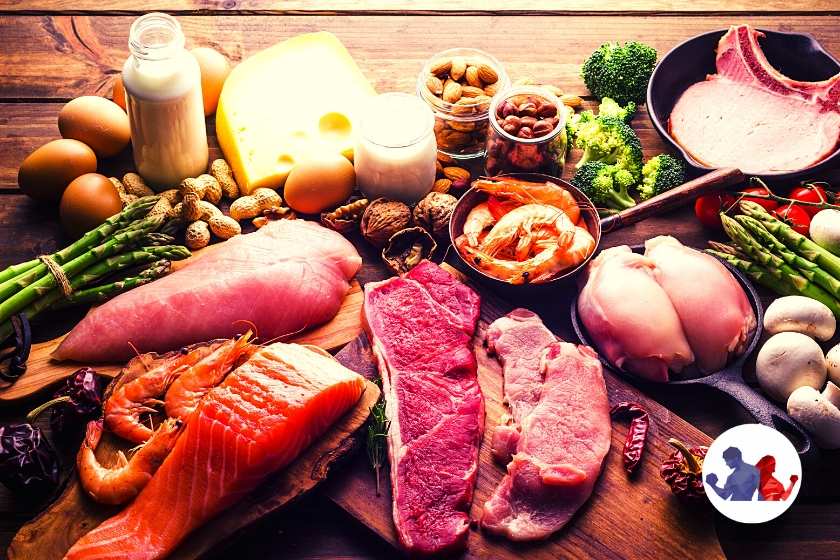Is a high protein diet plan really necessary to lose weight?
Protein is a vastly important nutrient that is required for growth, hormone and enzyme production, and transportation.
Most people know the importance of protein for muscle growth, yet, few recognize the role protein plays in weight loss.
This article will review a number of scientific articles to evaluate the impact of high protein diets on weight loss.
Table of Contents
What Is Protein?
There are three macronutrients that are key to maintaining good health and function. They are protein, carbohydrates, and fats.
Protein is made up of chains of compounds known as amino acids. There are twenty-two different amino acids that can be considered essential or non-essential (1).
The essential amino acids cannot be synthesized by the body and, therefore, must come through food. Non-essential amino acids can be produced by the body.
As a result of the amino acid profile, some foods contain a higher quality of protein than others.
For example, most animal products are seen as excellent sources of protein as they contain all essential amino acids.
High protein animal products include meat, fish, poultry, eggs, and dairy.
While most plant products are not great sources of protein, there are a few that contain a moderate amount. These include beans, nuts, seeds, legumes, and soy.
Why Do We Need Protein?

We must consume enough protein and essential amino acids if we are to optimize our health.
Protein is the macronutrient response for growth and development and can be found within muscle, bone, skin, and hair.
Our bodies are subject to stress and damage every day. Consequently, the body is in a perpetual state of regeneration and protein is the driving force behind this.
In addition to this, protein is also required for the production of hormones and enzyme production and transportation.
Hormones are chemical signaling molecules that send messages around the body and help to regulate body processes.
Enzymes are molecules that speed up the rate of almost all chemical reactions in the body. They play a crucial role in many bodily functions, such as metabolism and digestion.
Specific proteins are required for the transportation of molecules around the body. A great example of this is the protein hemoglobin that carries oxygen to cells (2).
Finally, while protein is not the primary source, it can also be used as energy. This typically occurs when the body is not receiving enough calories from carbohydrates or fats (3).
What Causes Weight Loss?
Before considering the benefits of a high protein diet on weight loss, let’s first consider the mechanism behind weight loss.
The only mechanism that causes weight loss is a calorie deficit (or negative energy balance). This is where the body burns more calories per day than it consumes.
Creating an energy deficit forces the body to find energy from another source. Therefore, it will begin to break down fat tissue and use that as energy instead.
Providing this deficit is maintained over a sustained period, significant weight loss will occur.
It’s important to understand that the goal of all diets is to create this calorie deficit. The calorie deficit is more important than the specific nutritional approach taken (4).
So, if weight loss is all about calories, how does consuming more protein influence it?
How Do High Protein Diets Influence Weight Loss?
This section will outline the benefits of high protein diets for weight loss.
Also, it will review several scientific studies that have reviewed the impact of high protein diets.
1. Boosts Metabolic Rate
Protein has consistently been found to increase the body’s metabolic rate. The metabolic rate refers to the number of calories burned naturally by the body during the day.
Research suggests that protein digestion can enhance metabolic rate by as much as 35% (5).
Specifically, protein is thought to enhance thermogenesis, which is the production of heat from the body (6).
When compared to carbs and fat, protein is more advantageous for boosting metabolic rate. At the same time, carbs and fats appear to increase the metabolic rate by 5 – 15% (5).
One study compared the impact of high protein and high carb meals on metabolic rate.
It concluded that the high protein diet increased metabolic rate substantially more than the high carb diet (7).
Other studies also suggest that consuming a high protein diet causes an increased calorie burn for several hours after eating (8).
Enhancing our metabolic rate and naturally burning more calories will facilitate a negative energy balance and subsequent weight loss.
2. Regulates Appetite
As highlighted earlier, protein plays a crucial role in hormone production and regulation. It has been found to impact on hormones that control appetite.
One particular hormone, known as ghrelin, is commonly referred to as the hunger hormone. Increased production of ghrelin will enhance feelings of hunger.
Research on protein consumption indicates that it inhibits ghrelin production and consequently suppresses appetite and hunger (9).
This is particularly beneficial for someone looking to lose weight as hunger can quickly become problematic.
In addition to decreasing ghrelin, protein also increases the production of other hormones such as PYY and GLP-1.
These hormones have been found to promote satiety and feelings of fullness (10).
As a result of improved appetite regulation, likely, total calorie intake will naturally decrease. Once again, this can contribute to a calorie deficit and weight loss.
3. Maintains Muscle Mass
Although a calorie deficit will cause fat tissue to breakdown, it may also cause muscle tissue to breakdown.
However, research suggests that following a high protein diet can help to preserve muscle mass during weight loss.
One meta-analysis reviewed twenty-four studies in an attempt to understand the impact of high protein diets on weight loss.
After reviewing the results, the authors recommended a high protein diet over a standard weight loss diet.
They also concluded that the high protein approach was best for preserving muscle mass and maintaining a high metabolic rate (11).
Therefore, not only do high protein diets facilitate weight loss, they can also significantly improve body composition.
Recommended Protein Consumption
There is still a lot of debate regarding optimal protein consumptions.
The Dietary Reference Intakes (DRI) recommendation for protein is 0.36 grams per pound of bodyweight.
By following this recommendation, someone who weighs 160 pounds would have to consume 59 grams per day.
However, many researchers believe this intake to be insufficient and argue that it should be higher (12).
While the DRI will be high enough to avoid a protein deficiency, it appears to be inadequate for optimizing health.
Several studies have investigated the impact of increasing protein intake on health and body composition.
The results have consistently indicated that increasing protein intake has a positive impact on both weight loss and body composition (13, 14).
However, there does appear to be an upper limit. One study split participants into two high protein groups.
One group consumed 0.75 grams per pound while the second group consumed 1.1 grams per pound.
The results indicated that both groups experienced similar changes in terms of body fat and muscle mass (15).
Therefore, the recommended amount of protein for weight loss is 0.6 – 0.75 grams per pound of bodyweight.
Finally, ensure that protein is consumed regularly throughout the day rather than all at once.
Studies have shown this to be most optimal for maximizing health and function (16).
How To Follow A High Protein Diet

This section will highlight four key steps to following a high protein diet.
1. Calculate Protein Demands
Before even beginning the diet, calorie needs need to be calculated. As highlighted, the recommended amount of protein per day is 0.6-0.75 grams per pound of bodyweight.
Be aware that as we lose weight, our protein need will also reduce. Therefore, ensure that this calculation is rechecked regularly, particularly after significant weight loss.
2. Customize The Diet
One of the best things about the high protein diet is that it can be customized to your preferences and goals.
For example, people with diabetes may find it beneficial to stick to a low-carb, high protein plan to manage blood sugar levels.
Vegetarians can also follow a high protein plan that does not contain animal products. The plan will likely revolve around high-protein foods such as beans, legumes, and nuts.
3. Consume Quality Protein Foods
To optimize health, it is recommended to eat a combination of animal and plant protein (where possible).
It is also crucial that we use high-quality foods in our diets. Look to consume fresh meats, eggs, and dairy, rather than processed meats and other refined products.
4. Remember To Track
Tracking is an excellent way of ensuring that we are consuming the right amount of calories and protein for weight loss.
Scientific studies have suggested that those who consistently track tend to achieve better results than those who don’t (17).
(An Example of) High Protein Diet Plan
| Day | Breakfast | Lunch | Dinner |
|---|---|---|---|
| Monday | Protein Pancakes | Salmon | Chicken Meatballs |
| Pecans | Whole-Grain Toast | Marinara Sauce | |
| Carrot Sticks | Spaghetti Squash | ||
| Tuesday | Frittata | Leftover Meatballs | Salmon |
| Potato | Spaghetti Squash | Potato | |
| Cheese | Spinach | ||
| Wednesday | Cottage Cheese | Avocado and Cottage Cheese Salad | Chilli |
| Walnuts | Brown Rice | ||
| Apple | |||
| Thursday | Omelet | Leftover Chilli | Shrimp Fajitas |
| Cheese | Brown Rice | Onions | |
| Chilli Peppers | Peppers | ||
| Friday | Oatmeal | Chicken | Halibut |
| Greek Yogurt | Pepper | Lentils | |
| Pecans | Avocado | Broccoli | |
| Saturday | Smoothie: | Salmon | Chicken |
| Protein Powder | Mixed Greens | Quinoa | |
| Coconut Milk | Olive Oil | Brussel Sprouts | |
| Strawberries | |||
| Sunday | Eggs | Greek Yogurt | Steak |
| Whole-Grain Toast | Mixed Nuts | Sweet Potato | |
| Almond Butter | Pineapple | Zucchini |
Risks and Side Effects
For most healthy individuals, a high protein diet is safe (18). That said, some side effects may be experienced including:
- Constipation / Diarrhea
- Dehydration
- Halitosis
- Headaches
- Irritability
- Nausea
A high protein diet may detrimentally impact kidney function in those who have kidney issues – either historical or current (19).
Therefore, those who suffer from medical conditions should always consult a doctor before making changes to their nutrition.
FAQs
Why do you lose weight on a high protein diet?
Increasing protein intake can help to increase feelings of fullness and enhance metabolism.
Changes in appetite may reduce calorie intake while enhancing metabolism may increase calorie burn. A combination of these things will create the calorie deficit needed for weight loss.
Is a high protein diet bad for you?
For the majority of individuals, a high protein diet is perfectly safe and healthy. However, those with medical issues, specifically relating to the kidneys, may experience complications.
It is advisable to speak with a doctor or nutrition before starting a high protein diet.
How much weight can you lose on a high protein diet?
This is dependent on several factors, including calorie intake, activity levels, and physical characteristics.
Providing a modest calorie deficit is maintained, we can expect to lose between one to two pounds of weight per week.
Which protein is best for weight loss?
There are many different types of dietary protein. Animal proteins tend to be most valuable as they contain all essential amino acids.
Plant proteins tend to miss at least one essential amino acid. However, by combining plant products, it may be possible to consume all essential amino acids.
What can you eat on a high protein diet?
The sole focus of the diet is simply ensuring that you consume a high amount of protein. It is not restrictive and does not prohibit specific foods.
High protein foods include meat, poultry, fish, eggs, dairy, legumes, beans, nuts, and seeds.
Should I use protein supplements?
For those who struggle to consume enough protein through their diet, a protein supplement is highly recommended.
Taking a protein supplement is a simple, safe, and effective way of boosting our total protein intake.
Summary
Consuming enough protein each day is vastly vital for maintaining good health and proper function.
Based on scientific research, it is clear that high protein diets can be beneficial for weight loss.
Increasing protein intake can boost metabolism and improve appetite control. As a result, the number of calories burned per day increases while calorie intake substantially reduces.
A combination of these things will lead to the creation of a calorie deficit. This is where the body burns more calories per day than it consumes.
Providing this deficit is maintained, a substantial amount of weight will be lost.
- https://www.ncbi.nlm.nih.gov/pmc/articles/PMC6247364/
- https://ghr.nlm.nih.gov/primer/howgeneswork/protein
- https://www.ncbi.nlm.nih.gov/pmc/articles/PMC2897177/
- https://pubmed.ncbi.nlm.nih.gov/18025815/
- https://pubmed.ncbi.nlm.nih.gov/15466943/
- https://www.ncbi.nlm.nih.gov/pmc/articles/PMC524030/
- https://pubmed.ncbi.nlm.nih.gov/11838888/
- https://pubmed.ncbi.nlm.nih.gov/9683329/
- https://pubmed.ncbi.nlm.nih.gov/16469977/
- https://pubmed.ncbi.nlm.nih.gov/16400055/
- https://pubmed.ncbi.nlm.nih.gov/23097268/
- https://pubmed.ncbi.nlm.nih.gov/26197807/
- https://pubmed.ncbi.nlm.nih.gov/25926512/
- https://pubmed.ncbi.nlm.nih.gov/23446962/
- https://pubmed.ncbi.nlm.nih.gov/23739654/
- https://pubmed.ncbi.nlm.nih.gov/25926513/
- https://www.ncbi.nlm.nih.gov/pmc/articles/PMC5568610/
- https://www.ncbi.nlm.nih.gov/pmc/articles/PMC5078648/#:~:text=5.-,Conclusions,more%20total%20calories%20and%20protein.
- https://www.ncbi.nlm.nih.gov/pmc/articles/PMC5962279/#:~:text=Purpose%20of%20review,for%20the%20management%20of%20CKD.
